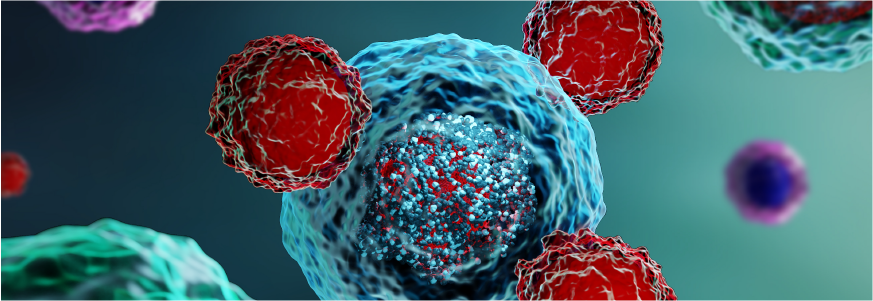Between 2022 and 2023, the number of patients undergoing CAR T-cell infusion at Duke almost doubled. “We’re seeing the same growth pattern continue in 2024 as well,” says Jake Keller, MHA, administrative director of the Duke Blood Cancer Center. “With the expansion in commercial CAR T-cell options at Duke, it's a viable treatment option for more patients. Duke is proud to be a center of excellence in this space, and we are dedicated to ensuring efficient access for all eligible patients seeking CAR T and Tumor-Infiltrating Lymphocyte (TIL) therapies.”
The Duke Blood Cancer Center is accredited to provide CAR T-cell therapy by the Foundation for the Accreditation for Cellular Therapy, and was the first center in North Carolina to offer CAR T-cell therapy. Today, Duke is among only a few centers certified to provide all six commercially available CAR T-cell therapies, including:
- ABECMA® (Bristol-Myers Squibb Company, Summit, New Jersey) for relapsed or refractory multiple myeloma
- Breyanzi® (Bristol-Myers Squibb Company, Bothell, Washington) for relapsed or refractory large B-cell lymphoma and chronic lymphocytic leukemia
- CARVYKTI® (Janssen Biotech, Inc., Horsham, Pennsylvania) for relapsed or refractory multiple myeloma
- KYMRIAH® (Novartis Morris Plains, New Jersey) for relapsed or refractory acute lymphoblastic leukemia and relapsed or refractory non-Hodgkin lymphoma
- TECARTUS® (Kite Pharma, Inc., El Segundo, California) for mantle cell lymphoma and relapsed or refractory acute lymphoblastic leukemia
- YESCARTA® (Kite Pharma, Inc., Santa Monica, California) for refractory non-Hodgkin B-cell lymphoma
CAR T-cell therapies YESCARTA® and Breyanzi® were FDA-approved in 2022 as second-line treatments for large B-cell lymphomas, and CARVYKTI® was approved in 2024 for second-line treatment in multiple myeloma. Before this, most CAR T-cell therapies were indicated only as third-, fourth-, or fifth-line treatments. FDA approval of KYMRIAH® further extended CAR T-cell treatment options for pediatric populations, including eligible children and young adults with acute lymphoblastic leukemia.
Later approvals of TECARTUS® and ABECMA® brought commercially available CAR T-cell treatment options to six — all offered at Duke.
Additionally, Duke recently became the first and only center in North Carolina to offer TIL therapy. In February 024, the FDA approved AMTAGVI™️ as the first commercial TIL in history. AMTAGVI™️ treats metastatic melanoma, and represents a new frontier in using cellular therapy to treat solid tumors.
To discuss a patient referral for CAR T or TIL therapy, call Duke’s Cell Therapy team at 919-684-7115 or email CARTatDUKE@duke.edu.
Increasing access
“When I speak to referring providers who don’t offer CAR T at their facilities, I tell them, ‘Let us worry about the logistics of it. Give us a chance to figure it out and use the resources we have to come up with a solution that works for us, but most importantly for the patient and their family,”’ says Krista Rowe-Nichols, RN, MSN, AOCNS, Duke Blood Cancer Center clinical nurse specialist.
A condition of CAR T-cell therapy is frequent appointments and close monitoring, so patients must reside locally during and up to 30 days after their infusion. Rowe-Nichols and her team connect patients with help to pay for treatment, mileage, lodging, and meals for patients and caregivers. These ancillary costs can be financially burdensome and not typically covered by commercial insurance.
“Duke is unique in terms of our managed care department and some of the additional layers of financial authorization approvals we facilitate beyond insurance authorizations,” says Rowe-Nichols. “We do all we can to protect our patients from financial risk.”
The team also mitigates clinical risks by anticipating potential side effects and being prepared to intervene. “What I can assure patients is that our team knows how to recognize even the worst side-effects, such as cytokine release syndrome and neurotoxicity, and we are well equipped to deal with them when they happen,” says Rowe-Nichols.
Advancing clinical trials
As a national trial site for CAR T-cell therapies since 2015, Duke Blood Cancer Center has offered groundbreaking immunotherapies to patients within months of FDA approval. The team continues its leadership in advancing CAR T-cell research, participating in a multi-institutional 20-year follow-up study to learn more about the long-term safety, effectiveness, and prolonged action of YESCARTA® and TECARTUS®.
Duke Blood Cancer Center also participates in several current clinical trials studying treatment resistance to CAR T-cell therapies. “We received an NCI grant about two years ago to understand the mechanisms of resistance and how to overcome them,” said Yubin Kang, MD, medical director of the CAR T program and director of the Kang Lab.
